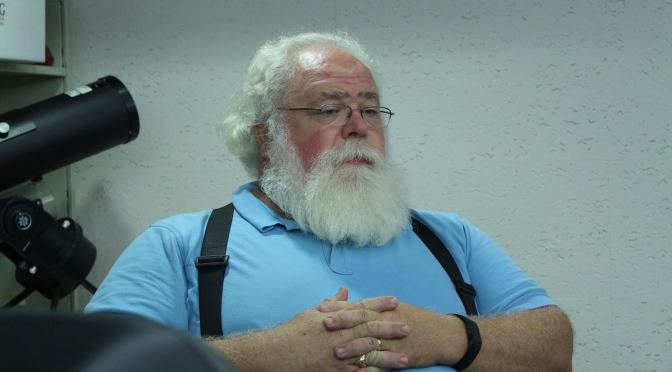
Proxima B lights up planetarium
By: Kristin Helf, Assistant Arts & Life Editor
The Watson-King Planetarium, perched atop Smith Hall, saw a full house of students and faculty learning at an “Other Earths” planetarium show Friday.
Alex Storrs, an associate professor of physics, astronomy and geosciences, presented the show where those in attendance could learn about the discovery of Proxima Centauri B, an exoplanet.
Proxima B is Earth-sized and in the habitable zone of its star.
“I’m intrigued, I think the way most people are, at the thought of finding another Earth, finding a place where people could live, where life could live,” Storrs said. “What I hope [students] gain from this is the knowledge that we have, in fact, now discovered places that could be very much like the Earth, and some kind of idea of what that’s like.”
Through images projected onto the dome-shaped planetarium screen, Storrs took viewers to Proxima B, where he explained the conditions of the planet and showed artist renditions of what the planet might look like.
Because Proxima B is four light years away and humans cannot travel faster than the speed of light, no one will be visiting the exoplanet anytime soon. By some estimates, a small robot could reach the planet within 20 years, but until then, scientists can only speculate on Proxima’s conditions, appearance and habitability.
“There’s a lot of speculation on the planet itself,” Storrs said. “Could it have liquid water, did it form too close to its star to have water on it, did the star change its brightness so it would have boiled away any water, could there be water on the far side of the planet? There’s all sorts of unknowns.”
Proxima B is Earth-sized and within the habitable zone and, while Storrs says that our species might visit such exoplanets one day, individuals living in the 21st century aren’t likely to get there until scientists figure out about how to keep humans alive outside of Earth’s biosphere.
“We don’t know all the things necessary to keep people alive, let alone sane and functioning, separate from the rest of society,” Storrs said. “We can argue about warfare and bigotry and xenophobia and so forth, but in the end, we actually really do need each other. Even if we need each other just to argue with.”
After the presentation, viewers went outside for a telescope observation of the cloudy night sky.
“It’s exciting to see new places, new worlds, new civilizations and lifeforms,” Storrs said. “So we can boldly go where no one has gone before.”

